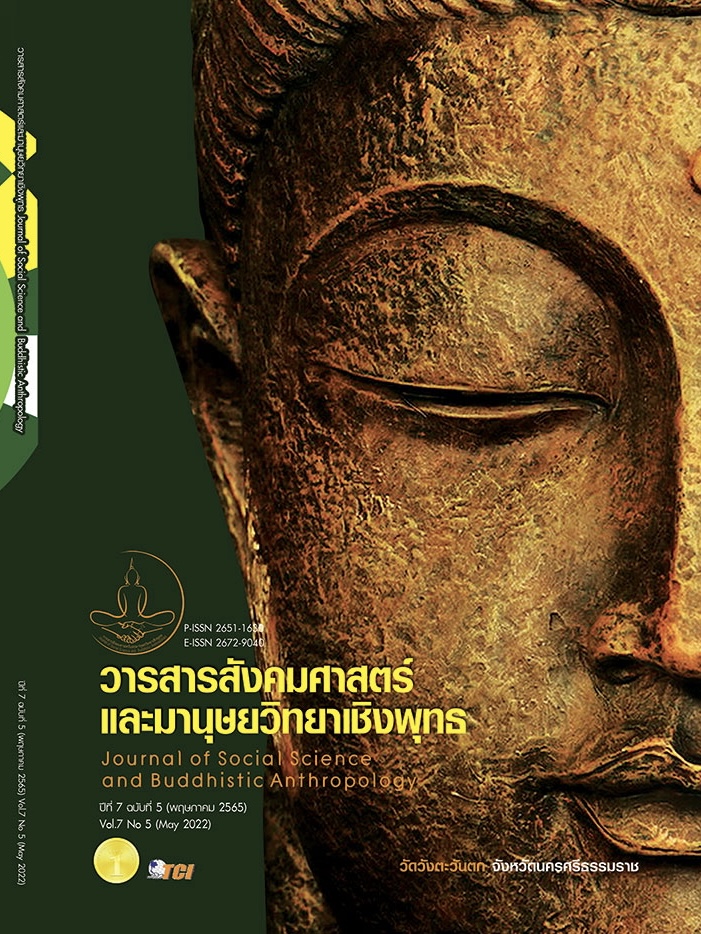THE PATTICIPATIVE MANAGMENET MODEL USING SCHOOL, COMMUNITIES AND LOCAL GOVERNMENT ORGANIZATION BASED FOR LEARNING RESOURCES DEVELOPMENT OF MAELAUNGUPPATHUMTHAIKEEREE SCHOOL, CHIANGRAI PRIMARY EDUCATIONAL SERVICE AREA OFFICE 4
Keywords:
Participative Management Model, School, Communities, Local Government Organization-Based, Learning Resources DevelopmentAbstract
The objectives of this research article were to development the participative management model using school, communities and local government organization based for learning resources development of Maelaunguppathumthaikeeree school by research and development methodology 4 steps as follow; 1) to study basic information about the participative management model by survey, literature reviewing, 5 school administrators and 11 academic experts by interview. 2) To create the drafting the model and checking and the models’ suitability assessment by 7 the academic experts, the data were collected by focus group discussion and questionnaires. 3) To implement participative management model in 2563BE-2564BE academic year by 54 teachers, the research tools were achievement summary report. And 4) to evaluate the model that the data was collected from 54 teachers in 2563BE-2564BE academic year by questionnaires. The statistics used for data analysis were the percentage, mean, standard deviation, content analysis and summary. The finding showed as follow: 1) for learning resources development using participatory management principles and action research process, the school administrator should set goals, activities, management process and be leader to action continuously improvement. 2) The participative management model consists of 5 components; (1) Principle, (2) objectives, (3) process (4) evaluation and (5) key success factors, and the procedure include 5 steps as follow: step 1: Analysis, step 2: Plan, step 3: Action, step 4: Observe and Evaluation and step 5: Reflection. 3) The results of implementation the model showed the students had knowledge, competencies, desirable characteristics and satisfaction towards learning activities using learning resources were at the highest level. And 4) the result of model evaluation in overall was at the highest level.
References
ทิศนา แขมมณี. (2558). ศาสตร์การสอน: องค์ความรู้เพื่อการจัดกระบวนการเรียนรู้ที่มีประสิทธิภาพ. (พิมพ์ครั้งที่ 19). กรุงเทพมหานคร: ด่านสุทธา.
ธนพล ด่านวิวัฒน์วงศ์ และคณะ. (2561). การบริหารแหล่งเรียนรู้โรงเรียนบ้านริมใต้ อำเภอแม่ริม จังหวัดเชียงใหม่. วารสารบัณฑิตวิจัย, 9(1), 115-130.
พิณสุดา สิริธรังศรี. (2560). การบริหารชุมชนและท้องถิ่นของโรงเรียน ในความเป็นผู้นำทางการศึกษา. กรุงเทพมหานคร: จุฬาลงกรณ์มหาวิทยาลัย.
เพ็ญนภา ชูพงษ์. (2556). การบริหารจัดการโรงเรียนขนาดเล็กแบบมีส่วนร่วมของชุมชนและองค์กรปกครองส่วนท้องถิ่น. ในดุษฎีนิพนธ์ปรัชญาดุษฎีบัณฑิต สาขาวิชารัฐประศาสนศาสตร์. มหาวิทยาลัยศรีปทุม.
โรงเรียนแม่หลวงอุปถัมภ์ไทยคีรี. (2562). รายงานการประเมินตนเองของสถานศึกษา ประจำปีการศึกษา 2562. เชียงราย: โรงเรียนแม่หลวงอุปถัมภ์ไทยคีรี สำนักงานเขตพื้นที่การศึกษาประถมศึกษาเชียงราย เขต 4.
สำนักงานคณะกรรมการการศึกษาขั้นพื้นฐาน. (2555). แนวทางการพัฒนาแหล่งเรียนรู้และการใช้นวัตกรรมในการจัดการเรียนรู้. กรุงเทพมหานคร: ศูนย์บริหารโครงการหนึ่งอำเภอ หนึ่งโรงเรียนในฝัน, สำนักงานคณะกรรมการการศึกษาขั้นพื้นฐาน.
สำนักงานเลขาธิการสภาการศึกษา. (2550). แนวทางการจัดการเรียนรู้ที่เน้นผู้เรียนเป็นสำคัญ การจัดการเรียนรู้จากแหล่งเรียนรู้. กรุงเทพมหานคร: สำนักงานเลขาธิการสภาการศึกษา.
สำนักงานเลขาธิการสภาการศึกษา . (2560). แผนการศึกษาแห่งชาติ พ.ศ. 2560 - 2579. กรุงเทพมหานคร: พริกหวานกราฟฟิค.
สุกัญญา แช่มช้อย. (2555). การบริหารโดยสถานศึกษาและชุมชนเป็นฐาน: ความท้าทายของการปฏิรูปการศึกษาในทศวรรษที่สอง. วารสารศึกษาศาสตร์ มหาวิทยาลัยนเรศวร, 14(1), 101-111.
Dodd, A. W. & Konzal, J. L. (2002). How Communities Build Stronger School. Palgrave: Macmillan.
Flaxman, E. (2001). The Promise of Urban Schooling. Eric Review, 8(Winter), 6-7.
Hernthaison, P., et al. (2017). Development of Participative Management System in Learning Environment for Small Sized Primary Schools. International Education Studies, 10(2). 4-14.
Joyce, B. & Weil, M. (2000). Model of Teaching. (6th Edition). Boston: Allyn and Bacon.
Kibler, R. J. (1974). Behavioral Objectives and Instructional Process. In Selected Reading for the Introduction to the Teaching Profession. Berkeley: McCutchan.
Downloads
Published
How to Cite
Issue
Section
License
Copyright (c) 2022 Journal of Social Science and Buddhistic Anthropology

This work is licensed under a Creative Commons Attribution-NonCommercial-NoDerivatives 4.0 International License.









